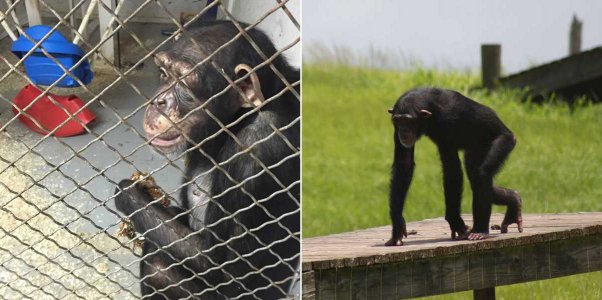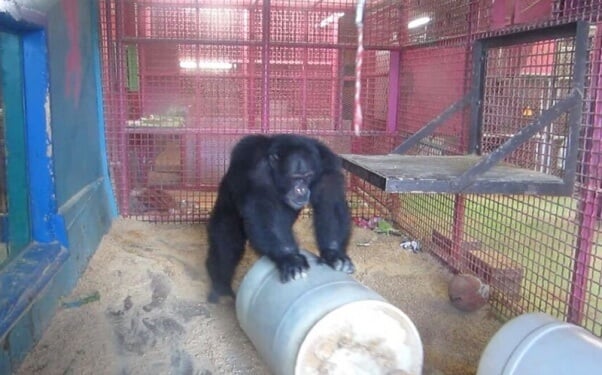From Misery in Missouri to a Greater Life at True Sanctuaries—Find Out How PETA Won for THESE Chimpanzees!
Massive victory! Chimpanzees are finally safe at accredited sanctuaries after years of deprivation at a former breeding facility in Festus, Missouri, thanks to PETA’s determined work on their behalf.
These highly intelligent and sensitive animals were confined at a decrepit facility called the Missouri Primate Foundation, where they were often warehoused inside cramped cells strewn with trash and their own waste. The stench of urine in one room was so overwhelming that a volunteer couldn’t enter—but there was no escape for the chimpanzees forced to live there.
But not anymore. Now, instead of barren cages, they’ll have a lush outdoor habitat where they can freely roam, explore, and play with other rescued chimpanzees. They eat nutritious food and receive expert care, and they’ll never again be exploited in any way.
For years, the Missouri Primate Foundation was the primary source of chimpanzees who were sold into the entertainment industry and the exotic-pet trade. This sad chapter in history is now closed, thanks to PETA.

PETA Revealed Misery in Missouri
The new lives that these chimpanzees are now enjoying are the culmination of years of dedicated efforts by PETA, including our eyewitness investigation of the Missouri Primate Foundation in 2014, which revealed just how miserable—and likely illegal—conditions were for the animals confined there.
Here were just some of our findings:
- Several chimpanzees exhibited signs of over-grooming, which can indicate psychological distress.
- Two chimpanzees named Connor and Candy were overweight.
- A chimpanzee named Joey was kept in solitary confinement.
- Excessive trash, debris, and apparent fecal matter were observed in the chimpanzees’ enclosures, and it was revealed that the facility only cleaned the cage floors once per week.
- The facility’s operator at the time, Connie Casey, was running it using nothing but her social security check. Reputable sanctuaries spend a minimum of $16,000 per year per chimpanzee to provide these sensitive, highly complex animals with appropriate care.
Beatings and Kidnappings: A Whistleblower’s Harrowing Account
After PETA broke our investigation, a former volunteer for the facility named Angela Scott contacted us to report concerns of abuse and neglect there. Brittany Peet from the PETA Foundation’s legal team met with Scott to hear her account, and it was as harrowing as we’d feared.
Scott described how Casey’s ex-husband would punch the chimpanzees and how workers at the facility would kidnap 3-day-old baby chimpanzees from their mothers—which she claimed involved luring the animals into cages and shooting them with blow darts while they screamed. According to Scott, one chimpanzee named Tammy became so upset that she would scream, throw items around in her cage, lift up her blanket to search for her babies, and then lie on a barrel for days with no appetite. One of Tammy’s daughters is believed to be Lisa Marie, pictured above, who was also exploited in the entertainment industry and who lived as a “pet” for years before PETA secured her a place at an accredited sanctuary in Florida.
Scott proved to be a valuable ally, even becoming a plaintiff in PETA’s Endangered Species Act (ESA) lawsuit against the former Missouri Primate Foundation.
A Hallmark Victory for Exploited Chimpanzees
PETA also launched a parallel campaign against Hallmark and American Greetings, calling on both to pull all greeting cards featuring chimpanzees, which are demeaning and hinder conservation efforts for great apes.
One of the chimpanzees PETA rescued from the Missouri Primate Foundation, Connor, was used for harmful greeting cards once sold by the companies. On the set of his final photo shoot, Connor reportedly bit his handler and tried to attack three other people.

Following persistent pressure from PETA, both companies—the two largest greeting card retailers in the world—stopped selling cards featuring chimpanzees.
PETA’s Landmark Legal Case Made Exploiters Quake
It was clear that the Missouri Primate Foundation wasn’t about to release its captives without a fight, so in 2017, our legal eagles filed an ESA lawsuit against Casey and the Missouri Primate Foundation.
We had a little help from our friends, too. Actor Alan Cumming, who appeared in the 1997 film Buddy with Tonka—one of the chimpanzees confined at the Missouri Primate Foundation—announced PETA’s lawsuit at a news conference. Cumming had previously sent a heartfelt plea to Casey, calling on her to release the chimpanzees to an accredited sanctuary, but to no avail. “Tonka and I developed a close camaraderie during the months we filmed,” Cumming said. “I am confident the courts will allow Tonka to enjoy some semblance of the life nature intended for him and the other discarded chimps.”
PETA’s lawsuit quickly won a reprieve for two chimpanzees boarded at the facility named Allie and Chloe. Their owners—who were listed as defendants in PETA’s lawsuit—agreed to surrender the animals to accredited sanctuaries, where they’re both thriving today.
The Missouri Primate Foundation Failed—and Chimpanzees Won!
In 2018, Casey transferred ownership of the remaining chimpanzees to Tonia Haddix, an “exotic” animal broker who sells primates and other animals to the pet trade and roadside zoos. PETA promptly added Haddix as a defendant in our lawsuit.
Then, in 2020, we negotiated a consent agreement that allowed Haddix to keep three of the chimpanzees at the facility if she met certain conditions—including constructing appropriate facilities for the animals—and allowed PETA to transfer the remaining four chimpanzees to an accredited sanctuary. The agreement specified that if Haddix failed to satisfy the conditions, all seven chimpanzees were to be transferred to a true sanctuary.
And guess what? She failed, and the chimpanzees won! The court ordered that all seven animals be transferred to an accredited sanctuary. Pursuant to the consent agreement, Casey and Haddix were both prohibited from ever again owning or possessing chimpanzees.
Six Great Apes Got a Great New Beginning—and One Went Missing
For the past three decades, the Center for Great Apes has provided over 40 chimpanzees with compassionate care—five of whom were originally born at Casey’s Missouri breeding compound and then sold as “pets.” Following PETA’s landmark win, six chimpanzees were relocated to the sanctuary, where some of them could meet their siblings for the first time and where Tammy would eventually meet one of her sons.
It was nearly the perfect happy ending—but our work wasn’t over just yet. Tonka, who was supposed to be surrendered with the others, was missing—and we made it our mission to find him.
The Search for Tonka Turned Up Another Victory
When Haddix claimed that Tonka had died, PETA sniffed out the falsehood from a mile away. We launched a nationwide search for Tonka’s whereabouts, which ended nearly a year later, when he was found concealed in a tiny cage in the basement at Haddix’s new residence. He could take only a few steps in any direction, he was not allowed to go outside, he couldn’t feel the warmth of the sun or the grass beneath his feet, he had no companionship with other chimpanzees (something extremely important to chimpanzees’ well-being), he was overweight (likely from lack of exercise), and he wasn’t receiving proper veterinary care.
Now, Tonka finally has the life he always deserved at the Save the Chimps sanctuary in Fort Pierce, Florida.
Deception, Lawbreaking, and Cruel Exploitation: Chimp Crazy Tells All
PETA’s dramatic legal battles against Haddix and the Missouri Primate Foundation are at the center of HBO’s Chimp Crazy—the latest docuseries from the director of Tiger King. Stream it now on Max, and take action below to help exploited chimpanzees:

